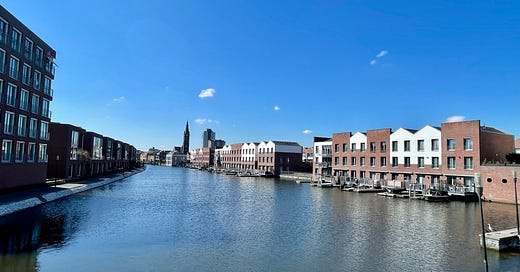When I moved to North America and made my first US-Canada border crossing many years ago, a Canadian border official asked me what I had bought while visiting the US. As a newcomer I had no idea what the significance of his question was, so I dutifully declared the pair of jeans I had picked up at an outlet in the town of Sumas. I was escorted into the office where another agent carefully examined the labels in my jeans which apparently had been manufactured in El Salvador. That was vital information as she went to a binder to check things and was able to produce a rate to be paid as a percentage of the retail value that applied to US bought jeans, made in El Salvador. I needed to pay up $15 or something like that. The amount, the time, and in particular the seriousness which these two Canadian public servants devoted to my small purchase felt obscene and really irritated me. Ever since I only give the vaguest responses to border officials.
This my friends explains tariffs. The very idea that another country can produce something in a cheaper way and that you might want to get it, is the trigger for one of the darker nationalist instincts that we thought were once long extinguished. That is until Donald Trump brought them back to life.
Now there are valid reasons to protect your home market. In a way you could argue that the idea to not let your manufacturing sector be wiped out by cheap products from for instance China is a sound proposition. Yet we don’t want to lock out China altogether and we are building a relationship where we want to sell our stuff to the Middle Kingdom too, things we happen to be good at. That’s why we have trade agreements to try and balance these competing instincts of having cheaper goods, but not get them in a way that ruins the lives of our fellow countrymen and women. And these trade agreements create certainty, we can price them into our assessments of what is going to happen. In that way we stabilize stock, bond and currency markets.
Trump’s actions last week sought to reverse the one thing that brought incredible wealth and stability globally over the past four or five decades in order to restore a nationalist economic fata morgana. All of a sudden manufacturers were supposed to to choose to locate their production in the US, hire American workers and thus keep the wealth inside the country to benefit all. But that is just one explanation. Another one is that Trump seeks to extract certain benefits from certain countries and imposing tariffs is just an opening shot. It could also be that he is trying to weaken US rivals like China by disrupting their economies. This however is a spurious argument as he has gladly attacked allies like Taiwan and Japan in a similar way. Or: as Trump believes the stock market is the measure of the economy, he had to let some air out of the Biden bubble as it had no more room to grow. Take it down to build it up again and take credit for it all. Another favourite is that he crashed the stock market to bring down interest rates.
Whatever the reason for this poorly constructed assault on the global order, we can only begin to assess the damage. Because yes, there is some hope that negotiations and exemptions (Canada, Mexico) create the basis for a new trade equilibrium and the stability we may yearn for. The problem is that Trump and his administration have made unpredictability the cornerstone of practically everything they do. A settled trade dispute may have a shelf life of only days, if that. The trust is gone and as the saying goes, it is like virginity, once you’ve lost it you can never get it back.
Western nations may patch it up and find a way to live with the economic vandalism coming from Washington. And Americans - even Republicans have already started - may start to draw the line and try to rein in some of the madness. Others like Beijing, may react in far more unpredictable and damaging ways. An interesting few weeks are ahead of us with no clear sense of where we are going.
Yes, we had a bit of radio silence here over the past week as I made my way through multiple family visits and business related things, topping it off with a London visit this weekend. Hanging around in Europe always gives you a good perspective on the mood. Dinner table discussions, news on TV, construction activity, local newspaper columns, they all help you put everything you see on social media into a much better perspective. It was a true delight to pick up a real newspaper from a London corner shop and flip through it drinking my Saturday morning coffee in the warm spring sun.
Most of what I see here though is not encouraging. Political dysfunction and divisions, inflation and affordability issues, and of course the daily dose of Israel-hate which comes in various forms at you. In fact some people even avoid the subject ‘Israel’ when I am in the room.
You will also hear endless theories on how to regulate the American ‘techbros’ while proudly parading that ‘Europe knows better’ all the way to stating that America’s military services are no longer required. The problem is: Europe still needs America when it comes to defence, in particular in Ukraine. The continent is far from unified on political issues and much of Europe actually runs on the very tools and services provided by the ‘techbros’ they seek to regulate or expel. And all the while the record being played on Israel is stuck in the 1990s: pointless language on the two-state solution and it sadly is on endless repeat. The only difference is now that antisemitism is fully operational and out in the open, much like what we see daily in Canada and the US.
What makes all of this actually a lot worse is the total political ineptness. A sampling: in Germany the coalition negotiations are going to favour the actual losing party, Scholz’s SPD; in France Marine Le Pen was barred from running for president last week sparking a divisive political crisis, in the UK Starmer and his policies are less popular than ever at a time when the post-Brexit economic decline is starting to bite. And in The Netherlands it is now clear that the idea of appointing a non-political prime minister was a terribly bad idea: the man has no effective power to manage his four squabbling right-leaning coalition parties who are not able to pass any legislation of note. It’s a real mess in the Dutch lowlands.
Each of these countries face urgent crises on housing, immigration, crime and yes, defence and security. And now Trump has added the international economy back on top of the agenda. It is a long list for a weak and divided continent that is drifting directionless in a changing global landscape where far more powerful players are setting the tone.
Let’s see how it all goes. I will be back in the Pacific time zone in a few days and look forward to getting back to regular programming here. Comments, questions: please fire away.
Photos: Town of my birth, Vlaardingen, the old and new merge seamlessly around the one thing that has defined the Dutch forever: water.
Sigmund Freud’s home in the Belsize Park area in London. I spent a few hours here, really interesting and I highly recommend a visit (it includes a small but well stocked bookshop).
A replica of the Hamas hostage tunnels is touring the Netherlands again (an initiative by Dutch-Israeli artist Rachel Meijler whose cousin Laor Abramov was murdered on October 7th). This triggered the pro-Hamas and anti-Israel crowd to such an extent that you get ugly scenes like the photo above. Things got out of hand last week and the police had to intervene. (photo: Bernard Blasband).






Thank you for my Sunday first cup of coffee read. Your opening paragraph sets a helpful introduction and context for the rest of your observations. Keep roaming.
Pieter, you left out how China joined the WTO, making solemn promises to play by the rules, and never did. Recitations of hypothetical Ricardian comparative advantage are a lie, because China has massively subsidized its own tech industry to bankrupt its American competitors. The US forfeited its prosperity for the benefit of China, based on the Ricardian fairy tale.